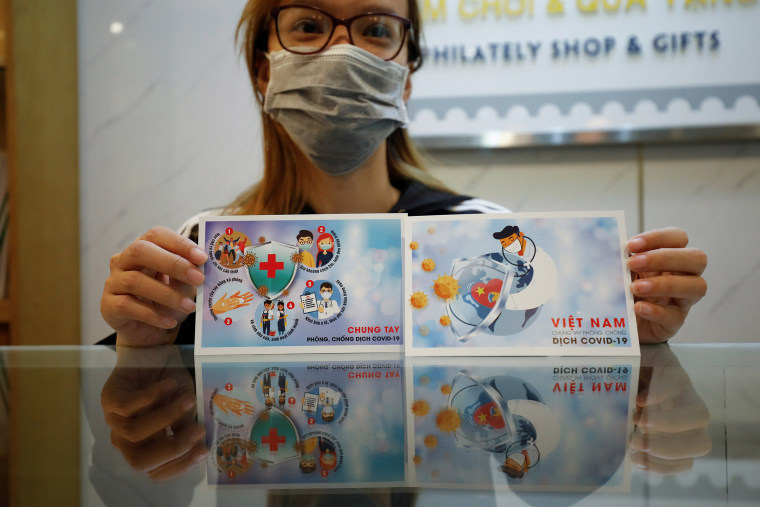President Donald Trump announced Sunday that he's extending his administration's guidelines on social distancing during the COVID-19 outbreak until April 30. The move marks a significant change for the president, who said last week that he wanted to see much of the country return to normal by Easter, April 12, despite warnings from top health experts that easing guidelines could cause widespread death and economic damage.
Meanwhile, in an interview with "TODAY" on Monday morning, White House coronavirus response coordinator Dr. Deborah Birx said she's "very worried" about every city in the U.S., saying 100,000 to 200,000 American deaths would be the outcome of a response that works "almost perfectly," according to projections.
Birx's stark message comes after a weekend where the governors of Michigan and Louisiana warned of a lack of resources to respond to the crisis and said that shortages of ventilators and protective equipment could overwhelm hospitals as soon as this week.
The global death toll is now nearly 35,000, and there are more than 140,000 confirmed cases in the U.S., according to Johns Hopkins University.
Full coverage of the coronavirus outbreak
- Here's what to know about the coronavirus, plus a timeline of the most critical moments.
- MAPS: Where cases have been confirmed in the U.S. and worldwide.
Download the NBC News app for latest updates on the coronavirus outbreak.
This live coverage has ended. Continue reading March 31 Coronavirus news.
China's manufacturing rebounds as virus controls ease
BEIJING — China’s manufacturing rebounded in March as authorities relaxed anti-disease controls and allowed factories to reopen, an official survey showed Tuesday, but an industry group warned the economy has yet to fully recover.
The ruling Communist Party is trying to revive the world’s second-largest economy after declaring victory over the coronavirus even as the United States and other governments shut down businesses.
The purchasing managers’ index issued by the Chinese statistics bureau and the official China Federation of Logistics & Purchasing rose to 52 from February’s record low of 35.7 on a 100-point scale on which numbers above 50 show activity increasing.
The federation and private sector economists cautioned the economy still faces challenges as manufacturers rebuild supply chains and authorities try to prevent a spike in infections as employees stream back to work.
NYC doctor: Feels like a tsunami is about to hit us
11 vets die at Massachusetts Soldiers' Home
The superintendent of a veterans facility in Massachusetts was placed on leave Monday, the same day it was reported that 11 residents had died, including at least five who had tested positive for the coronavirus illness COVID-19.
A state official said that test results are pending for five others who died at the Soldiers’ Home in Holyoke. The status of the 11th person who died was unknown.
Eleven other residents have tested positive as well as five staff members, and an additional 25 veteran residents are awaiting test results. NBC affiliate WWLP of Springfield reported the deaths at the Soldiers' Home earlier Monday.
Los Angeles County sheriff reverses decision on closing gun stores
Los Angeles County's sheriff said Monday night that he will no longer seek to have gun stores closed under government orders requiring "non-essential" businesses to be shuttered.
Sheriff Alex Villanueva said in a statement that the change is due in part to federal guidelines about what are essential critical infrastructure workers. But the move also comes after the National Rifle Association and others sued.
The orders are designed to slow the spread of the coronavirus illness COVID-19. Villanueva said his office will investigate reports of any business that is not observing social distancing rules.
Nevada officials criticized after opening parking lot shelter for homeless
Officials are facing criticism for using a Las Vegas parking lot as a temporary shelter after a facility was closed when a homeless man tested positive for COVID-19 last week.
Officials from Las Vegas and Clark County opened the temporary shelter at an event site lot a few miles north of the Las Vegas Strip on Saturday after determining that 500 people using Catholic Charities' overnight facility would have nowhere to sleep, said David Riggleman, the city’s communications director.
When mats that could easily be disinfected weren’t available, hundreds of six-foot squares were painted onto the asphalt and surrounded by metal barricades — a grid meant to prevent more cases of the disease through social distancing measures, he said.
What if I run out of toilet paper?
Trump declares disaster in Pennsylvania
President Donald Trump on Monday declared a “major” disaster in Pennsylvania because of the coronavirus outbreak, the White House said.
The White House said Trump ordered federal assistance to the state, where 49 people have died from COVID-19, the disease caused by the virus. More than 4,000 cases in the state have been confirmed.
The funding can be used by local governments and non-profits for emergency protective measures, the White House said.
New York City turning tennis stadium into hospital
New York City will turn a Queens tennis stadium into a makeshift hospital to treat hundreds of non-COVID patients, officials said Monday.
In a statement, the city’s Emergency Management agency said it was planning to build the 350-bed facility at the Billie Jean King National Tennis Center in Flushing Meadows-Corona Park.
The announcement came as the coronavirus death toll continued to climb in the city. Earlier Monday, officials said that 138 people had died in 24 hours.
NCAA to give spring sport athletes extra year of eligibility
The NCAA will permit Division I spring-sport athletes — such as baseball, softball and lacrosse players — who had their seasons shortened by the coronavirus pandemic to have an additional year of eligibility.
The NCAA Division I Council voted Monday to give spring-sport athletes regardless of their year in school a way to get back the season they lost, but it did not guarantee financial aid to the current crop of seniors if they return to play next year.
Winter sports, such as basketball and hockey, were not included in the decision because many athletes in those sports had completed all or most of their regular seasons, the council decided.
Trump approves disaster declaration for Rhode Island
President Donald Trump on Monday approved a disaster declaration for Rhode Island amid the coronavirus outbreak.
More than 400 people in the state have been infected and at least four people have died, according to the state's department of health.
The president previously declared disasters in a number of other states, including New York, California, Washington, Louisiana and Florida.
FDA authorizes use of antimalarial drugs for coronavirus treatment
According to the FDA, anecdotal reports suggest that hydroxychloroquine and chloroquine may offer some benefit for patients in serious condition.
More than 138 more deaths in New York City in 24 hours
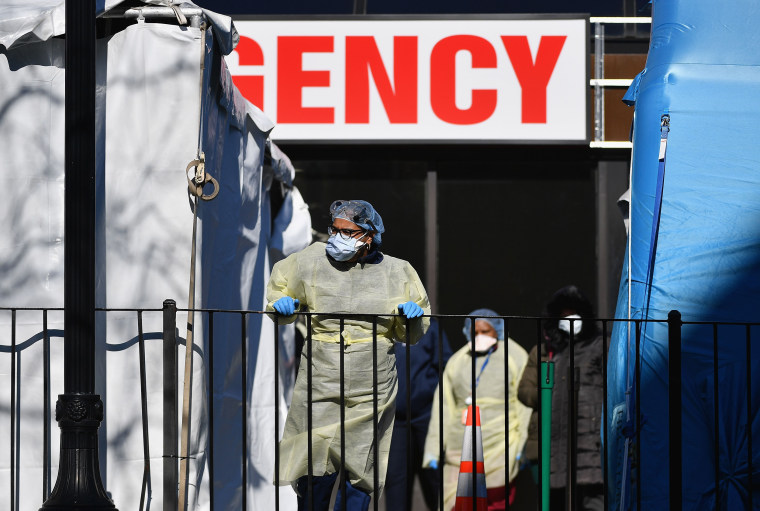
Since Sunday evening, 138 more people have died in New York City as a result of coronavirus, for a total of 914 deaths as a result of the outbreak in the city, according to the NYC Department of Health.
There are now 38,807 New Yorkers who have tested positive for the virus. To date, 20 percent of all cases have resulted in some type of hospitalization, a total of 7,741. Half have been of people age 75 or older.
Judges block abortion bans, ordered as part of coronavirus response, in Texas and Ohio
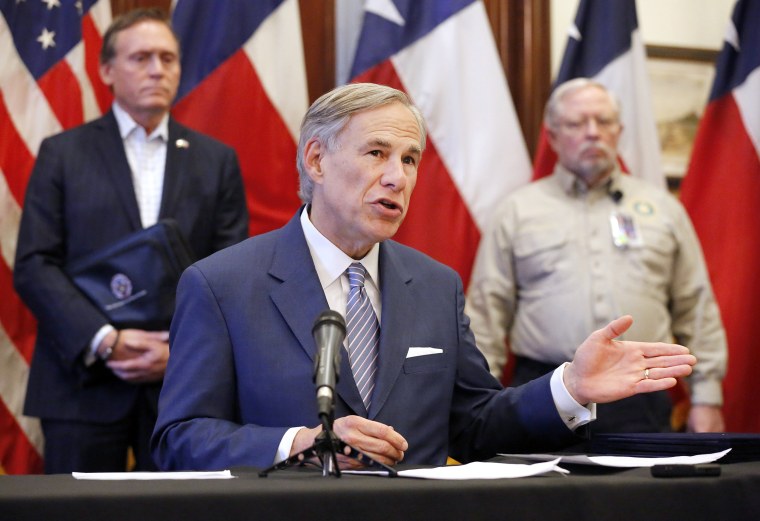
Judges in Texas and Ohio have temporarily blocked abortion bans that were included as part of those states' response to the coronavirus pandemic.
Texas Gov. Greg Abbott last week ordered doctors to postpone procedures that were not medically necessary, and Texas Attorney General Ken Paxton added that the order includes "any type of abortion." Abbott's order came just two days after the Ohio Attorney General David Yost ordered clinics to stop abortions in order to preserve personal protective equipment for healthcare workers.
Federal Judge Lee Yeakel in Austin said in his decision Monday that the Texas order was too broad and violated the constitutional guarantee of a woman's right to choose.
The American Civil Liberties Union, which filed the legal challenge to halt the ban, celebrated the Ohio decision by a federal court on Monday.
"Abortion is essential, time-sensitive health care — and it will continue in Ohio," the organization said.
Brooklyn man arrested for allegedly coughing on FBI agents, selling marked-up medical gear
A Brooklyn man has been busted for allegedly assaulting FBI agents with a potentially deadly weapon — a cough.
Baruch Feldheim claimed he had the coronavirus and “allegedly coughed in their direction” when FBI agents busted him Sunday in the New York City borough on suspicion of peddling surgical masks, respirators and other badly-needed medical supplies at “an approximately 700 percent markup,” according to federal prosecutors in New Jersey.
Feldheim, 43, was charged with assaulting a federal officer and making false statements to law enforcement.
Pentagon announces first coronavirus death of U.S. service member
The Pentagon announced on Monday the death of a New Jersey National Guardsman from COVID-19 complications, marking the first coronavirus fatality of a U.S. service member.
In a statement, the Department of Defense said the guardsman, who died Saturday, tested positive for the virus and had been hospitalized since March 21.
The guardsman was identified as Douglas Linn Hickok by his daughter, Shandrea Hickok. New Jersey Gov. Phil Murphy said Hickok was a drilling guardsman and physician’s assistant.
Number of long-term care facilities with cases tops 400 nationwide
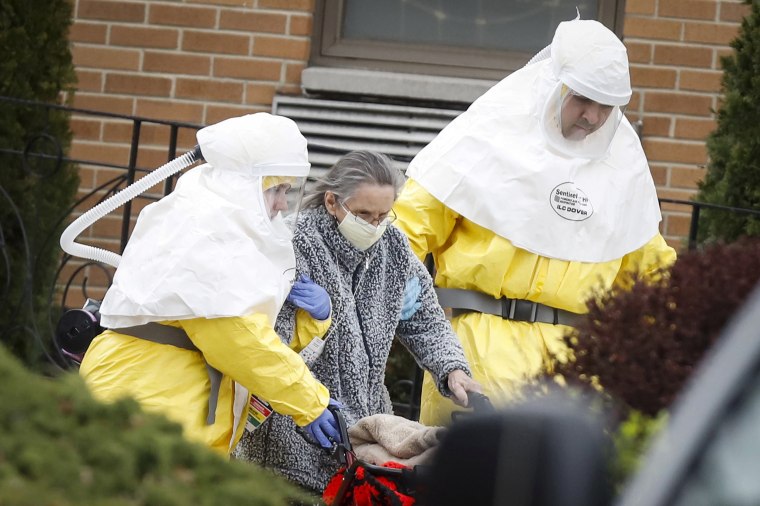
The Centers for Disease Control said Monday that more than 400 nursing homes and other long-term care facilities in the U.S. have coronavirus cases, a 172 percent rise since Monday, March 23.
Signs from multiple states point to a rapid increase in cases in nursing homes and other long-term care facilities.
In fact, NBC News counted nearly 300 in just 3 states and 1 county that reported their own totals.
Prisoners in New York City jails sound alarm as coronavirus spreads
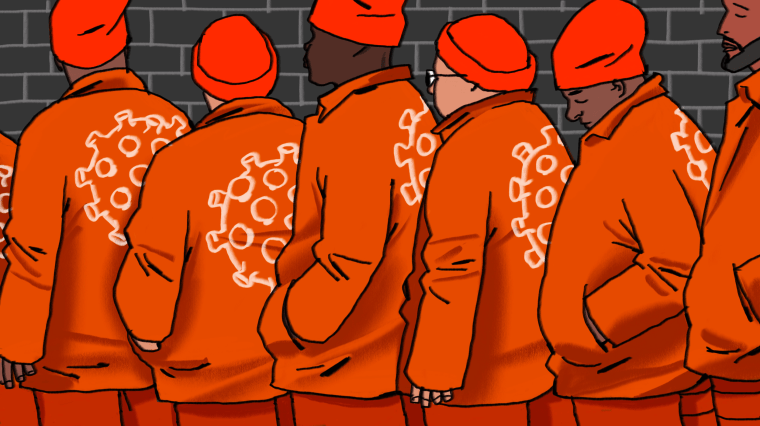
Inmates in New York City's jails say they feel a growing dread as the coronavirus spreads among both prisoners and guards. So far, 167 inmates and 114 Department of Correction staff members have tested positive for COVID-19.
“I fear for my life,” said Tyrell, 30, who is being held at Rikers Island on a parole violation. “I don’t want to catch coronavirus. I came here healthy and I don’t want to leave here with it.”
The COVID-19 outbreak at Rikers Island and other New York jails shows how quickly the disease may spread in lockups around the country, experts and advocates said.
Are masks 'going out the back door' of NYC hospitals, as Trump suggests?
President Trump has repeatedly questioned the rate at which a hospital in New York is using medical supplies, suggesting that theft was why the unnamed facility needs 300,000 masks a week.
“There’s only a couple of things that could happen — is it going out the back door? And I’ve reported it to the city and let the city take a look at it. But when you go to 10,000 masks to 300,000 masks... there’s something going on," Trump said.
But there's no evidence for this — and New York officials say they don't know what the president is talking about, either.
Coronavirus deniers take aim at hospitals as pandemic grows
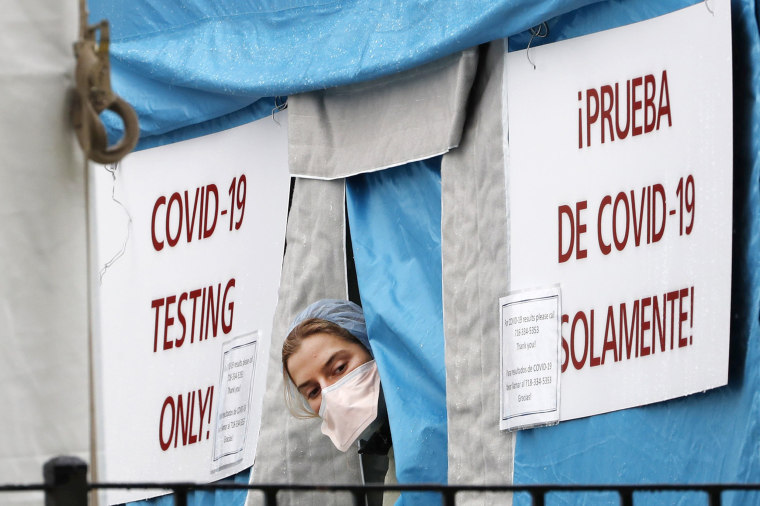
On Saturday, a video taken outside The Brooklyn Hospital Center went viral, showing a quiet scene in an attempt to counter the idea that the coronavirus pandemic has strained some hospitals.
That video, taken by former Fox News commentator Todd Starnes, jump-started a conspiracy theory that resulted in a trending hashtag and millions of video views — all of which pushed the idea that the pandemic has been overblown by public health organizations and the media.
A day later, a different video of the same hospital went viral on Facebook and Twitter. It showed dead bodies being loaded onto an 18-wheeler outside of the same hospital. The video, which was retweeted by a member of the New York City Council, was later confirmed as legitimate by the hospital.
Arizona latest state to issue stay-at-home order
Arizona Gov. Doug Ducey on Monday ordered the nearly 7.3 million citizens in his state to stay at home, unless they're performing or seeking essential services.
The action, aimed at curbing the spread of coronavirus, will go into effect at 5 p.m. on Tuesday and last until at least April 30.
Arizona has about 7.28 million residents, with about 17.5 percent of them age 65 or older, according to data from 2019. As of Monday evening, Arizona had 1,157 confirmed cases and 20 deaths due to coronavirus.
Renowned surgeon who separated twins joined at the skull dies of coronavirus
A prominent New York neurosurgeon who developed a procedure for separating twins conjoined at the skull died Monday from complications of COVID-19, the disease associated with coronavirus, officials said.
Dr. James Goodrich was the director of pediatric neurosurgery at Montefiore Mecial Center, in the Bronx, and a professor of clinical neurosurgery at Albert Einstein College of Medicine.
He gained fame in 2016 after leading a team of dozens of doctors in a 27-hour procedure that separated 13-month-old twins, Jadon and Anias McDonald, whose skulls and brains were fused.
“Jim was in many ways the heart and soul of our department — a master surgeon, a world-class educator, and a beloved colleague,” said Emad Eskandar, a professor of neurosurgery at Albert Einstein, in a statement. "His sudden loss is heart- breaking."
Coronavirus comes for Detroit: Why certain Michigan residents are at higher risk
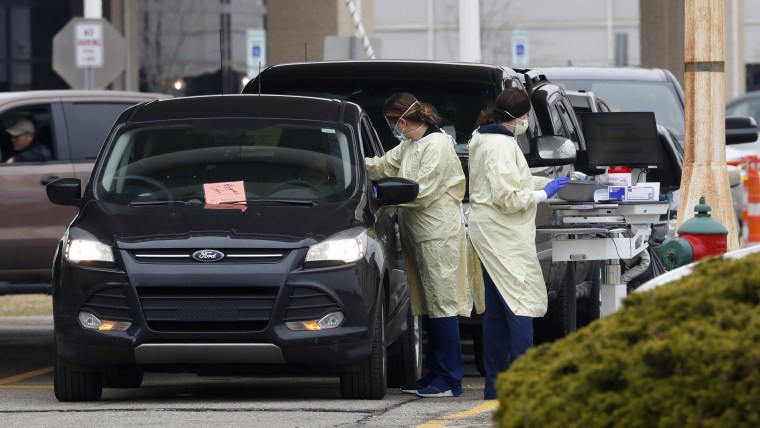
Shomari Stone watched as, one by one, five of his family members tested positive for the coronavirus in Michigan.
"My grandmother tested positive. My uncle tested positive," Stone, who now lives in Maryland, said. Stone's father-in-law and two of his cousins have also been diagnosed. All live near Detroit.
Stone's story is not unique; there have been nearly 6,500 coronavirus cases in Michigan so far, particularly in the southeastern part of the state, where Detroit is located, including Wayne, Macomb and Oakland counties.
Washington, D.C., issues stay-at-home order
Washington, D.C., Mayor Muriel Bowser issued a stay-at-home order Monday as the number of coronavirus cases in the city continues to rise.
"Staying at home is the best way to flatten the curve and protect yourself, your family, and our entire community from COVID-19," Bowser said. "Many people want to know how they can help right now, and for most people this is how – by staying home."
Boswer's order follows similar decisions issued in Maryland and Virginia earlier Monday. District residents will join a number of other Americans in staying home in an effort to slow the spread of coronavirus and only leaving home for essential needs.
Outbreaks at 11 nursing homes, ‘dozens and dozens’ responders sick in L.A. County
Los Angeles County Director of Public Health Barbara Ferrer told reporters Monday that her agency is investigating COVID-19 outbreaks at 11 county nursing homes, and that “dozens and dozens” of local health-care workers have also tested positive.
She also said there have been 342 new cases of coronavirus and 7 additional deaths in the county since Sunday, bringing the total number of cases to 2,474 with 44 deaths.
That brings the total number of cases in the County as of March 30 to 2,474 positive cases with a total of 44 deaths. The county’s coronavirus mortality rate is currently 1.8 percent of those known to be infected.
Small study shows breakdown of underlying conditions in critically ill patients
A new analysis of some of the most critically ill patients in Seattle adds to the growing understanding of who is most at risk for severe complications of the coronavirus.
Out of 24 patients, more than half (58 percent) of the patients had type 2 diabetes, 21 percent had chronic kidney disease and 14 percent had asthma.
Nearly all of patients in the analysis had to be on a ventilator. Half later died, mostly those over age 65. Patients said their symptoms began anywhere between four and seven days before they were ultimately admitted to the ICU. The most common symptoms were cough and shortness of breath. Only half had fevers, suggesting high temperature may not be a good way to screen for the illness.
The new report was published Monday in the New England Journal of Medicine.
Ford and GE team up to produce 50,000 ventilators by July
Ford and GE Healthcare will work together to produce 50,000 ventilators by July, the companies announced in a joint statement Monday.
The ventilators will be produced by 500 paid volunteers represented by the United Auto Workers labor union, at Ford's Rawsonville plant in Michigan.
The machines will be produced from Florida-based Airborn Corp.’s design, and will address the needs of most COVID-19 patients.
Ventilator production will begin the week of April 20 and eventually ramp up to an output of around 7,200 ventilators per week.
“Our deep understanding of the health care industry with Ford’s supply chain and production expertise will help meet the unprecedented demand for medical equipment. We continue to be encouraged by how quickly companies are coming together in innovative ways to address this collective challenge," said GE Healthcare President and CEO Kieran Murphy in a statement.
Photos: Inside Central Park's field hospital
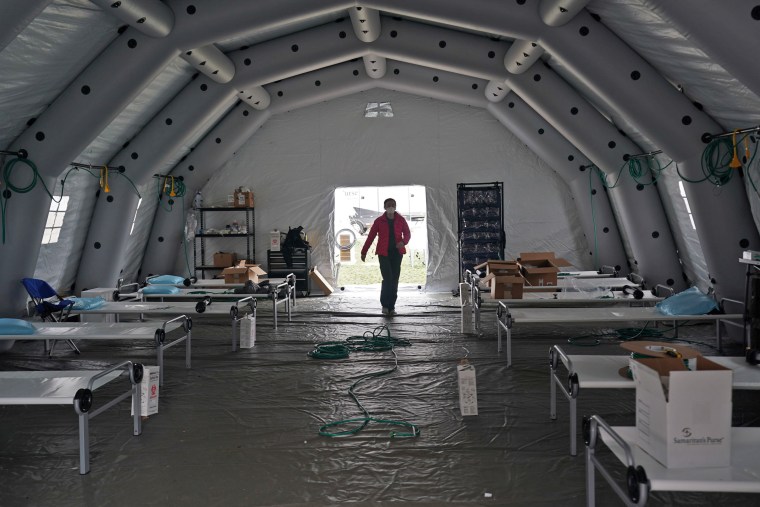
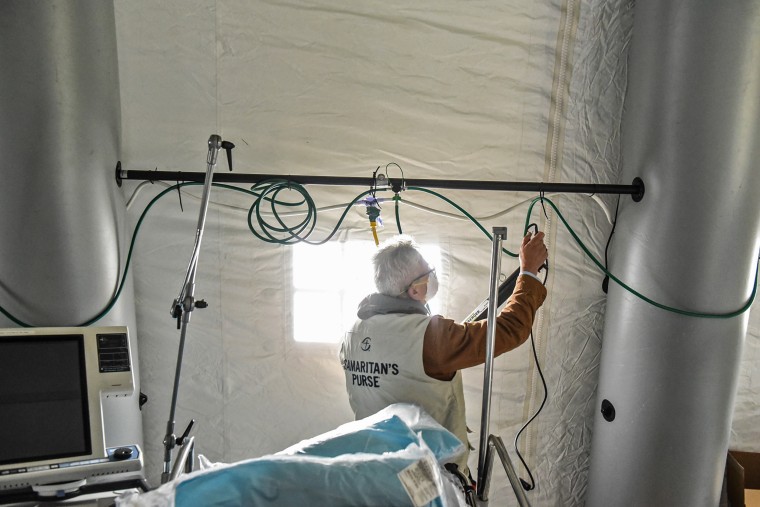
Can you catch the coronavirus twice?
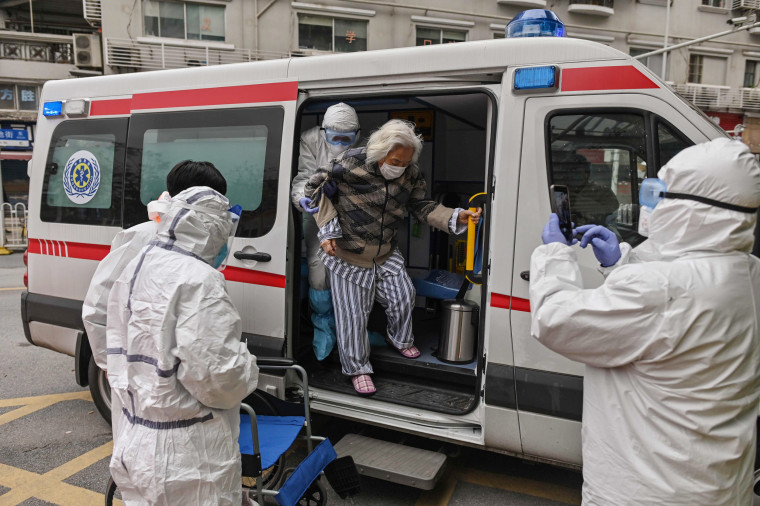
Those who recover from the coronavirus are probably not going to catch the illness again, at least in the short term, experts say. But it's unclear how long that immunity will last.
"It is reasonable to predict we will have some immunity. To say you will have lifelong immunity? We just don’t know yet, said Frances Lund, professor and chair of the department of microbiology at the University of Alabama at Birmingham. "But I think it’s a reasonable conclusion that you will have immunity for the rest of this season."
FBI warns video conference users to watch out for 'Zoom-bombing'
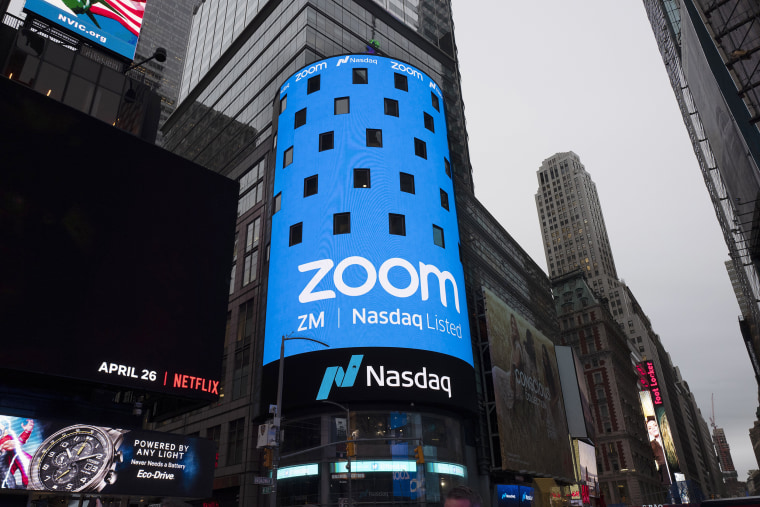
Use of Zoom and other video-conferencing platforms has soared during the coronavirus outbreak, and now the FBI in Boston is warning users to watch out for “Zoom-bombing,” in which hijackers disrupt Zoom sessions with pornography, profanity and hate.
The FBI says two schools in Massachusetts were “Zoom bombed,” with one hijacker yelling profanity and another displaying swastika tattoos.
To avoid such incidents, the bureau recommends requiring a password or using Zoom’s waiting room feature to screen guests, and never making teleconference links available on public social media posts. Users can also set the screensharing option to “Host Only.”
Wall Street rallies on hopes vaccine and shutdown extension will limit economic damage
The Dow Jones Industrial Average ended Monday 690 points higher, while the S&P gained around 3.3 percent. The tech-heavy Nasdaq ticked up by around 3.6 percent, after Amazon, Microsoft, and other sector leaders performed well throughout the day.
Pharmaceutical companies saw some of the day's largest stock gains, on news that there could be a vaccine for coronavirus.
However, all three major averages are likely facing a volatile week, with a raft of economic data set to be released, including the consumer confidence index on Tuesday, weekly jobless claims on Thursday, and the monthly unemployment numbers on Friday.
The first three months of 2020 are still on track be the worst performing quarter since 2008.
Abortion rights groups sue over states suspending procedure
A coalition of reproductive rights groups, including Planned Parenthood, the American Civil Liberties Union and the Center for Reproductive Rights, are taking legal action in four states over abortion access during the coronavirus outbreak.
Alexis McGill Johnson, acting president and CEO of Planned Parenthood Federation of America, said that now is the time to make abortion more accessible, not less.
“Abortion is essential, reproductive health is essential and this is time sensitive care,” Johnson said. “Right now people are just trying to survive this crisis. Women are just trying to survive this crises and politicians are trying to take away their health care.”
The lawsuits were filed in Alabama, Iowa, Ohio and Oklahoma after officials suspended abortions, saying they were nonessential medical procedures.
Rep. Velazquez presumed positive, was near Pelosi and on House floor
Rep. Nydia Velazquez said Monday she's been "diagnosed with presumed coronavirus infection," three days after she spoke on the House floor and stood near 80-year-old House Speaker Nancy Pelosi during the signing of the $2.2 trillion coronavirus stimulus bill.
In a statement, the Democrat from New York said she first started feeling sick "in the wee hours of Sunday morning."
Florida pastor arrested after holding church services despite coronavirus orders
Sheriff's deputies on Monday arrested the head of a Florida church, accusing him of ignoring local orders against mass gatherings due to the coronavirus pandemic and showing "reckless disregard for human life," authorities said.
The River at Tampa Bay church held services over the weekend, and Hillsborough County Sheriff Chad Chronister said he had no choice but to take action against the pastor, Rodney Howard-Browne.
San Francisco staying at home until at least May 1
San Francisco's mayor said the city's stay-at-home order would be extended until at least May 1.
Photo: Protesters block traffic to call for prisoner release in Philadelphia
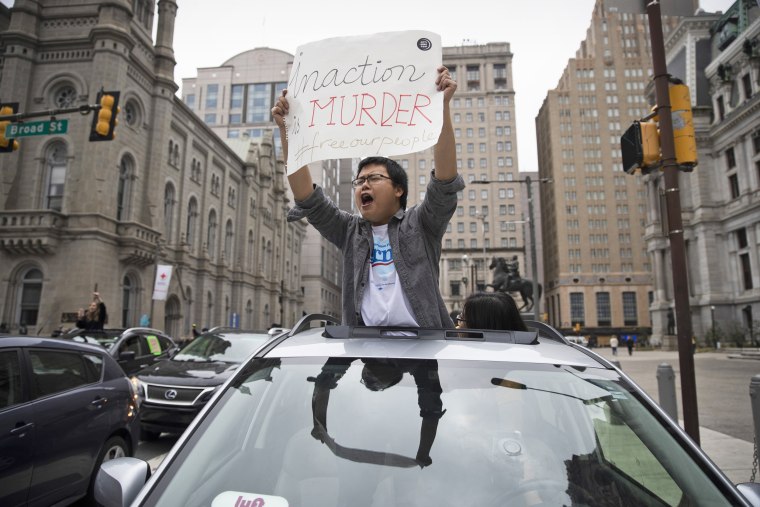
Virginia issues stay at home order as cases top 1,000
Virginia Gov. Ralph Northam on Monday issued a stay at home order for the state's 8.5 million residents as the state's coronavirus case count topped 1,000.
Residents must stay where they live unless they are going out for food, supplies, work, medical care or to get fresh air or exercise, Northam said during a news conference.
Gatherings of more than 10 people are prohibited, the governor said.
"If you can work remotely, you need to do so, and companies need to allow that," he added.
Biden defends visibility amid coronavirus pandemic
Joe Biden, in an interview with MSNBC Monday, defended himself from criticism that he’s not been sufficiently visible as the 2020 Democratic front-runner amid the growing coronavirus pandemic.
“The best I can do from my position is to lay out what I think should be done, how to do it,” Biden said, in response to a question about whether he was making himself “visible enough.” “When it is not being done, say why.”
Before launching a more robust virtual campaign, Biden had faced growing questions about his lack of a national presence during the ongoing outbreak.
The former vice president, asked during his interview whether Trump was doing anything right during this emergency, praised the president for resuming the frequent appearances of Dr. Anthony Fauci, the director of the National Institute of Allergy and Infectious Diseases.
Biden, however, ended the interview by making a joke that addressed the criticism of his whereabouts.
“Thanks for giving me the time. So they don’t wonder where I am,” he said.
Gannett, publisher of USA Today and other newspapers, is temporarily slashing salaries
Gannett, the country’s largest newspaper publisher by print circulation, is cutting editorial salaries, the company announced Monday.
"We expect our revenue to decline considerably during this period and we need to address this situation head on. By choosing a collective sacrifice, we can keep our staff intact, reduce our cost structure, deliver for our readers and clients and be ready to emerge strong and with opportunity to grow when this crisis passes," Paul Bascobert, CEO and president of Gannett Media, wrote in a memo to staff.
According to the memo, executives will be taking a 25 percent pay cut, and some journalists will be asked to give up one week of salary per month. Bascobert said he will not draw any salary until the pay reductions are reversed.
Gannett, whose titles include USA Today and The Des Moines Register, recently merged with New Media Investment Group and promised cutbacks even before the devastating effects of coronavirus on the advertising economy. It had previously targeted $300 million in cost cuts in 2020.
Massachusetts veterinary school loans out ventilators to support Boston hospital
Dr. Alastair Cribb, a veterinarian and dean of Cummings School of Veterinary Medicine at Tufts University, told NBC News that its facilities loaned out four ventilators and donated personal protective equipment to support hospital staff at Tufts Medical Center in Boston.
“We have other ventilators that we could use short term with our patients,” Dr. Cribb said, referring to animal patients. He said that other U.S. veterinary hospitals have also donated ventilators.
Cribb added that his veterinary center is no longer allowing people with their pets into its clinics for safety precautions.
“We speak to them on the phone, get the animal in,” Dr. Cribb said. “It’s very important that veterinary medicine is still available for people that need to care for their animals while keeping everyone as safe as possible.”
Cuomo says New York curve continues to grow as deaths top 1,200
New York Gov. Andrew Cuomo said Monday that the state’s curve continues to go up, as it now has 66,497 cases, including 1,218 deaths — up from 965 deaths the previous day.
“Those numbers are daunting,” Cuomo said at a news conference. “It’s continuing to move across the state of New York. Anyone who says this situation is a New York City only situation is in a state of denial.”
The governor said that among the over 66,000 people with the virus, 9,517 are hospitalized and 2,352 of those are ICU patients, adding that 4,204 patients have been discharged.
“What you see us going through here, you will see happening across this whole country,” Cuomo warned.
The governor called on health care professionals across the country whose communities are not currently in crisis to come to New York and lend a hand. “Come help us please and we will return the favor,” he said.
Cuomo spoke of the need for more medical supplies, and the difficulty of getting supplies while competing against other states, private hospitals, and the federal government.
Pentagon directs military bases to stop releasing coronavirus figures
The Pentagon has directed military bases to no longer provide specific numbers of COVID-19 cases to the press and public, citing operational security concerns and the need to ensure America’s adversaries don’t see any vulnerabilities.
Pentagon spokesman Jonathan Rath Hoffman said the Defense Department will continue to provide total numbers of coronavirus cases at the service level but will not release figures specific to each base.
“If a commander believes that COVID-19 could affect the readiness of our strategic deterrent or strategic response forces, we understandably protect that information from public release and falling into the hands of our adversaries - as we expect they would do the same,” Hoffman said in a statement.
As of 5 a.m. Monday, there were 569 uniformed military members who have tested positive for the virus but no deaths, according to the Pentagon. An additional 220 Defense Department, 190 dependents, and 64 contractors have tested positive. One contractor and one dependent have died from the virus.
First minor in NYC dies
New York City reported its first death of a minor on Monday, as the city's death toll rose to 790. Like the majority of those who have died from COVID-19, the minor had an underlying health condition.
Of the 790 people who have died from COVID-19 in the city, all but 13 had underlying conditions. The city department of health's definition of "underlying conditions" includes diabetes, lung disease, cancer, immunodeficiency, heart disease, hypertension, asthma, kidney disease, and GI/liver disease.
Coronavirus unemployment rate could hit 32 percent, Fed estimates
Unemployment could hit 47 million, or 32 percent, according to a recent analysis from the Federal Reserve. That rate would be higher than levels seen during the Great Depression, where unemployment peaked at 24.9 percent.
“These are very large numbers by historical standards, but this is a rather unique shock that is unlike any other experienced by the U.S. economy in the last 100 years,” St. Louis Fed economist Miguel Faria-e-Castro wrote in a research paper.
That figure does not estimate the impact of recently passed government stimulus, which will extend unemployment benefits and subsidize companies for not cutting staff and extending unemployment benefits.
A record 3.28 million Americans filed initial jobless claims for the week ended March 21. Economists expect another 2.65 million to join them this week.
Travel nurse heading to New York scrambles to find housing
Before New York City became one of the epicenters of COVID-19, travel nurse Jessica Fink signed a contract with Stony Brook Hospital to take care of patients in the neurology ICU. But when thousands of cases started popping up in New York, it became clear there was an outbreak.
“My recruiter called and said I could cancel my contract if I wanted to and stay home,” the 32-year-old nurse said. But Fink, a 14-year nursing veteran, couldn’t back away. “I found out the unit I am going to is going to be dedicated to exclusively treating COVID patients,” she said.
She’s driving to New York City from Pennsylvania on Tuesday, and she’s scrambling to figure out her housing situation. Before the outbreak, Fink preemptively rented a room from an older woman. But given the infection rate of the virus, Fink is trying to find isolated housing to prevent community spread.
“Thinking that I could be a vector of harm is very distressing for me. I am a nurse, I want to do no harm,” she said. She has called various hotels that are opening up rooms to healthcare workers during the pandemic, but she says she has been directed to auto response emails that say hotels are working with organizations.
“I am worried that being an individual person, I won’t get access because I am not with FEMA.” she said.
Macy's to furlough most of its 130,000 employees
Macy's will be putting the majority of its 130,000 workers on furlough, the company said Monday.
"Across Macy’s, Bloomingdales, and Bluemercury brands, we will be moving to the absolute minimum workforce needed to maintain basic operations," the company said in a statement. "This means the majority of our colleagues will go on furlough beginning this week."
Most of the furloughs will be in Macy's stores, which have been shut down since March 18, with some furloughs in Macy's online businesses, distribution centers and call centers.
The company said furloughed employees will continue to receive health benefits through at least May.
Johnson & Johnson to start human trials of coronavirus vaccine in September
Johnson & Johnson announced Monday that it has selected a coronavirus vaccine candidate to test in humans.
The experimental vaccine will begin the first phase of human clinical trials in September, and if the testing goes as planned, the first round of vaccines could be administered under emergency authorization in early 2021, according to the company.
Johnson & Johnson has been working on a potential vaccine for COVID-19, the disease caused by the coronavirus, since January. In an interview with the “TODAY” show, the company’s chairman and CEO Alex Gorsky said it’s a candidate “that has a high degree of probability of being successful.”
J&J also revealed plans to devote more than $1 billion for vaccine research, development and testing in partnership with the U.S. Department of Health and Human Service’s Biomedical Advanced Research and Development Authority.
Economy will be back on track by June, says Treasury Secretary Steven Mnuchin
The government will provide eight weeks of payroll to small businesses, Treasury Secretary Steven Mnuchin told Fox Business on Monday, for a total of around $350 billion.
If those funds do not prove to be enough, "we will go back to Congress" to negotiate for more, he said.
The economy will likely surge back by June, Mnuchin said, adding that the stock market with "absolutely" return to its previous highs. For long-term investors, the U.S. is still a great bet, he said, echoing the message frequently disseminated by Larry Kudlow, President Donald Trump's top economic adviser.
Mnuchin said the administration hopes to release further instructions for small businesses later on Monday.
Facebook commits $100 million for news organizations
Facebook has announced a $100 million commitment to support news organizations covering the coronavirus pandemic, bolstering last year's $300 million investment in local news.
Facebook will give $25 million in emergency grant funding for local news through the Facebook Journalism Project and $75 million in additional marketing spend in select news outlets.
The coronavirus pandemic has forced advertisers to cut their budgets, depriving news outlets of much-needed revenue and raising existential questions about the long-term health of the industry, particularly at the local level.
Spain surpasses China's total number of cases
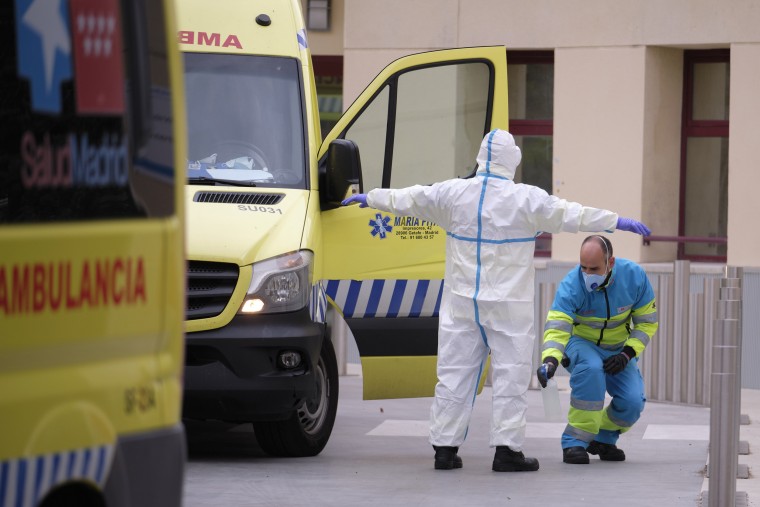
Spain has become the third country to surpass the total number of reported coronavirus infections in China.
The country's health ministry announced 6,398 new cases Monday, bringing the total to 85,195 cases.
That number is higher than China's reported 81,470 cases as of Monday.
The U.S. currently has the most confirmed coronavirus cases with 142,801 infections. Italy is second with 97,689 coronavirus cases.
Birx predicts up to 200,000 deaths if U.S. acts 'almost perfectly'
The White House coronavirus response coordinator said Monday that she is "very worried about every city in the United States" and projects 100,000 to 200,000 American deaths as a best case scenario.
In an interview on "TODAY," Dr. Deborah Birx painted a grim message about the expected fatalities, echoing that they could hit as high as 2.2 million without any measures, as coronavirus cases continue to climb throughout the country.
"I think everyone understands now that you can go from five to 50 to 500 to 5,000 cases very quickly," Birx said.
Israel's Netanyahu to self isolate after aide tests positive
Israeli Prime Minister Benjamin Netanyahu is self-isolating after one of his aides tested positive for the coronavirus.
The prime minister’s office said Monday that Netanyahu and his close staff would remain in isolation until an epidemiological investigation into his contact with the aide had been completed. The ministry of health and the prime minister’s personal physician would determine the day to end the isolation, Netanyahu’s office said.
The announcement came as Israel’s longest-serving prime minister is currently negotiating to form an emergency unity government with his chief political rival, Benny Gantz. It looks set to allow Netanyahu to retain power. Israel has recorded more than 4,300 positive cases, including 482 in the last 24 hours, according to the health ministry. Fifteen people have died in Israel due to the disease.
Tokyo Olympics rescheduled to start in July 2021
The Tokyo 2020 Olympic Games that were postponed last week because of the coronavirus pandemic have been rescheduled for next summer.
The games will open on July 23 and close on Aug. 8, 2021. The Paralympics will be held Aug. 24 through Sept. 5, 2021.
They were originally scheduled to take place between July 24 and Aug. 9 this year, but Japan's Prime Minister Shinzo Abe and the International Olympic Committee agreed last Tuesday to postpone the games, as countries around the world struggle to contain the epidemic that has claimed more than 34,000 lives and forced millions around the world into lockdowns.
Hearses, songs and drones: How Colombian police get the coronavirus message across
U.S. military contractor tests positive for COVID-19 on S.Korea base
Another American military contractor at the U.S. Camp Humphreys base in South Korea tested positive for COVID-19 on Monday, officials said, bringing the total to five.
The U.S. citizen is currently in isolation at his residence, off the military base, and last visited the camp on March 27, according to a statement from the United States Forces Korea (USFK).
Officials said they were undertaking contact tracing to determine if anyone else had been exposed to the virus. This makes the 13th case of coronavirus for U.S. Forces in Korea, according to an NBC News count.
La-Z-Boy furloughs 70 percent of its workforce, slashes executive pay
La-Z-Boy is furloughing 70 percent of its workforce and closing all U.S. factories, stores, and warehouses until at least April 13, the furniture maker announced on Sunday.
In addition to cutting senior management salaries by 50 percent, and by 25 percent for other staff, the company said it will also freeze its 401(k) match.
"While the decisions made were extremely difficult and we deeply regret the impact they will have on those affected and their families, they are deemed necessary as we face one of the most challenging periods in our history," said Kurt Darrow, chairman, president and CEO of La-Z-Boy.
La-Z-Boy is one of the largest employers in Michigan, with around 6,800 people.
Italian doctor plays ‘Don’t Stop Me Now’ after grueling shift
After finishing a shift treating COVID-19 patients at a hospital in northern Italy, one doctor headed straight for the piano.
Still wearing his personal protective equipment, including mask and shoe coverings, the doctor performed parts of the songs “Don’t Stop Me Now” and “Crazy Little Thing Called Love,” by Queen, at the Ospedale di Circolo in Varese.
“He could not have chosen a better song,” hospital director Gianni Bonelli told NBC News, who did not name the doctor.
Italy, the worst-hit country in Europe, has recorded more than 97,000 cases of coronavirus and nearly 11,000 deaths, officials said on Sunday.
Police in Nepal use special device to keep safe distances during lockdown
Iran to release 100,000 prisoners as 3,000 new cases recorded
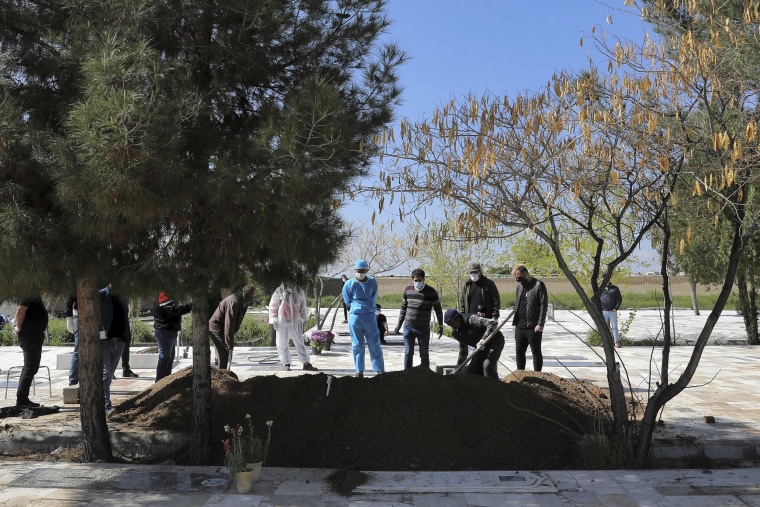
Iran has recorded more than 3,000 new coronavirus cases in the past 24 hours, bringing the total number of cases to 41,495, the country's health officials said Monday.
More than 100 new deaths were registered, with the total now standing at 2,757.
On Sunday, Iran's judiciary spokesman Gholamhossein Esmaili said nearly 100,000 prisoners will be temporarily released to ease the pressure on the healthcare system as the country struggles to contain the coronavirus outbreak. It's the second wave of prisoners to be released amid the epidemic.
Earlier this month, Iran temporarily freed about 85,000 people from jail, including political prisoners.
Italian fashion houses shift to making medical gear
From Bulgari to Prada, high-end Italian fashion houses are switching from manufacturing luxury handbags and perfumes to masks, white coats and hand sanitizers in an effort to stem the spread of coronavirus in one of Europe's hardest hit countries.
On Sunday, the special commissioner for the coronavirus emergency, Domenico Arcuri, announced that 25 Italian fashion brands would begin manufacturing 200,000 masks a day in converted factories and workshops.
The production will eventually gear up, with the aim of delivering 500,000 masks per day from next week and eventually reaching 700,000 masks a day, he said.
Last Friday, the Armani Group announced that its Italian production plants had switched to manufacturing single use overalls for healthcare workers involved in the fight against coronavirus. Bulgari, a luxury jeweler founded in 1884, said last week it had begun to produce several hundred thousand bottles of hand sanitizers, sporting the slogan: 'Hand in hand with Italy.'
Klobuchar opens up about husband contracting coronavirus
Sen. Amy Klobuchar, D-Minn., said Sunday that it can be very lonely living with COVID-19, which her husband tested positive for and is self-isolating in their Washington, D.C., apartment.
"This is a disease like no other," Klobuchar told MSNBC's "Kasie DC." "It's a very lonely disease. It's lonely in the ramp-up, it's lonely if you get really sick and it is lonely afterward, because you really can't go out there until you know are you not contagious."
She said that she was staying in a Senate colleague's apartment until her husband, John Bessler, gets the green light from doctors to make sure he can't spread the disease to others.
"I hope my husband's story will be helpful for many is that he is only 52. He's really healthy. We have no idea how he got it and he ended up in the hospital with severe pneumonia," she said. "He had been coughing up blood, he was there for a few days, turned the corner and is now home."
Medical workers in Spain and Italy 'overloaded' as more of them catch coronavirus
Doctors, nurses and other medical workers on the front lines of the coronavirus epidemic in Italy and Spain are succumbing to the respiratory illness themselves in ever increasing numbers, leading many to complain about inadequate protective equipment and supplies.
The two hardest-hit countries in Europe have together recorded more than 17,000 deaths from COVID-19, the disease caused by the virus, as of Monday.
In Italy, the country’s National Institute of Health said Monday that 8,358 health workers have tested positive for the coronavirus so far, nearly nine percent of the total number of infected nationwide. A total of 61 medical workers have died of COVID-19 since the beginning of the outbreak, according to the Italian Federation of Medical Professional Associations.
Officials in Spain have not revealed how many, if any, medical workers have died from the coronavirus, but in his most recent briefing about the subject, Fernando Simon, the head of the country's emergency coordination center, said Friday that 9,444 had contracted it. Just six days earlier, that number stood at 3,475.

Russian PM asks regions to consider implementing new restrictions
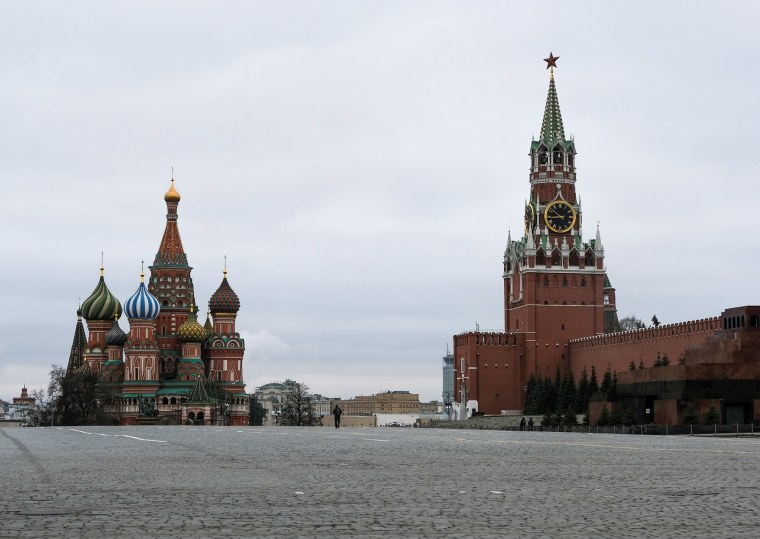
Russian Prime Minister Mikhail Mishustin has asked regional governors to look at restrictive measures taken in Moscow to curb the spread of the coronavirus, state news agency RIA reported Monday.
"I ask the leadership of Russian federal subjects to pay attention to the experience of their colleagues [in Moscow] and work out the possibility of implementing similar measures in their regions," Mishustin said, according to RIA.
Authorities announced a partial lockdown on Sunday, with Mayor Sergey Sobyanin signing an order that severely restricts freedom of movement both in the capital and the surrounding suburbs.
People can now only leave their homes to get emergency medical help, shop at the nearest grocery store or pharmacy and to go to and from work if deemed essential. On Monday, Russia reported 302 new cases, 212 of which are in Moscow, bringing the total to 1,836 cases with nine deaths.
Arrivals to South Korea face two-week self-isolation
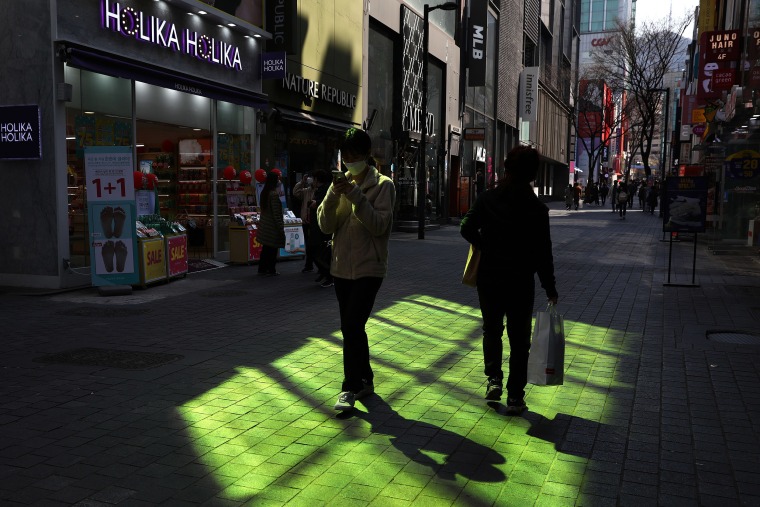
The South Korean government is tightening quarantine measures for all overseas arrivals starting on April 1.
On Monday, Health Minister Park Neung Hoo said anyone entering the country will need to self-isolate for two weeks.
“The two weeks of self-isolation rule will be applied to both locals and foreigners regardless of long-term or short-term stay,” Park said.
He added that entrants without a place to stay in South Korea will be housed in an isolation facility provided by the government and will have to pay for the space provided.
Nearly 10,000 people have tested positive for the coronavirus in South Korea, but the number of deaths stands at 158, much lower than in the U.S. and European countries where thousands of people have died.
Questions as Tokyo sees spike in cases after Olympics delay
A rise in the number of coronavirus cases in Tokyo immediately after the postponement of the Summer Olympics has raised questions about whether Japan understated the extent of the outbreak and delayed the enforcement of social distancing measures, while clinging to hopes that the games would start in July as scheduled.
“In order to make an impression that the city was taking control of the coronavirus, Tokyo avoided making strict requests and made the number of patients look smaller," former Japanese Prime Minister Yukio Hatoyama said in a tweet. “The coronavirus has spread while they waited. (For Tokyo Gov. Yuriko Koike) it was Olympics first, not Tokyo's residents.”
Prime Minister Shinzo Abe said Saturday that Japan is now on the brink of a huge jump in cases as it becomes increasingly difficult to trace and keep clusters under control.
Health minister Katsunobu Kato said there is “absolutely no relationship” between the Olympic postponement and the number of confirmed cases.
U.K. could take six months to get 'back to normal,' official says
It could take the U.K. six months to get "back to normal" as it enters the second week of a nationwide lockdown to curb the coronavirus pandemic, England's deputy chief medical officer said Sunday.
Speaking at the government's daily coronavirus briefing, Jenny Harries said the government will need a couple more weeks to see if restrictions to stop the virus spreading are working, adding that the U.K. must not suddenly revert to business as usual if the measures are successful.
"So over time, probably over the next six months, we will have a three-week review. We will see where we are going," she said, later clarifying that it doesn't mean the country will be in complete lockdown for six months.
There are also concerns that an extended lockdown in the U.K. could put a significant emotional strain on the public. On Sunday, Prince William and his wife Kate encouraged people to look after their mental health.
Nigerian cities set for new restrictions
Nigerians in Lagos, Abuja and Ogun State will enter a partial lockdown after the president ordered the "cessation of movement" set to begin Monday evening. The order will last for at least 14 days.
"All citizens in these areas are to stay in their homes. Travel to or from other states should be postponed. All businesses and offices within these locations should be fully closed during this period," President Muhammadu Buhari said in a televised address Sunday.
Given its poor public health system, health experts are concerned about a widespread outbreak in the country of 200 million.
Hand sanitizer and thermometers ready at entrance to Wuhan mall
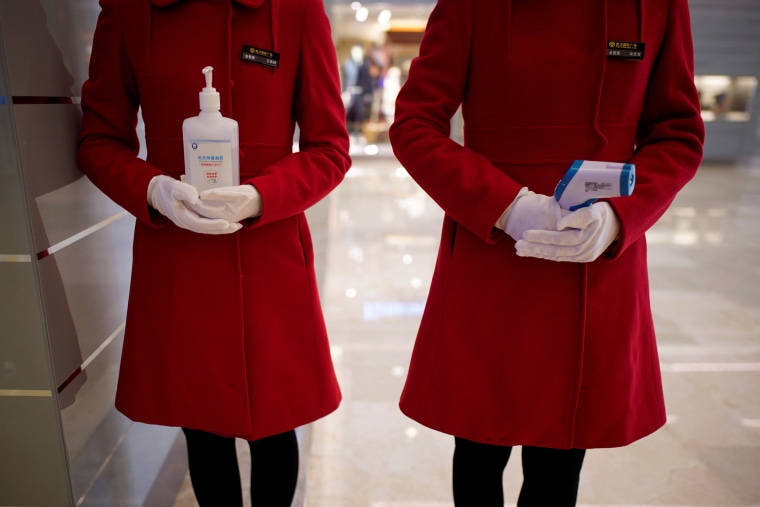
Songwriter of 'I Love Rock 'n' Roll' dies of COVID-19
Alan Merrill — who wrote the song “I Love Rock 'n' Roll" that became a signature hit for fellow rocker Joan Jett — died Sunday in New York of complications from the coronavirus, his daughter said. He was 69.
Laura Merrill said on her Facebook account that he died in the morning.
“I was given 2 minutes to say my goodbyes before I was rushed out. He seemed peaceful and as I left there was still a glimmer of hope that he wouldn’t be a ticker on the right hand side of the CNN/Fox news screen," she wrote. “I walked 50 blocks home still with hope in my heart. The city that I knew was empty. I felt I was the only person here and perhaps in many ways I was. By the time I got in the doors to my apartment I received the news that he was gone."
Merrill said her father was in good spirits recently. She went to a show of his about two weeks ago and had taken a photograph of him for his new album, Merrill said.
Drugs donated to feds as possible COVID-19 treatment
The federal government said Sunday that it accepted millions of doses of a drug that scientists are studying as a possible treatment for COVID-19.
The Department of Health and Human Services said in a statement that Sandoz, a subsidiary of Novartis, donated 30 million doses of hydroxychloroquine sulfate, and Bayer Pharmaceuticals donated 1 million doses of chloroquine phosphate.
The oral prescription drugs are used to treat malaria, but there’s anecdotal evidence they may help patients suffering from COVID-19.
The donations were announced one day after the Centers for Disease Control and Prevention warned people against using a non-pharmaceutical version of the drugs. Last week, an Arizona man died and his wife became critically ill after they consumed it in a parasite treatment for fish.
Two large health insurers waive coronavirus treatment costs
Health insurers Cigna and Humana are now waiving patient cost-sharing on all treatment for coronavirus, including hospitalizations and ambulance transfers, for their insured members and employer plans.
“Our customers with COVID-19 should focus on fighting this virus and preventing its spread,” said David Cordani, Cigna president and CEO, in a statement, adding “while our customers focus on regaining their health, we have their backs.”
The insurers said the waiver applies to all medical costs related to the treatment of coronavirus, including FDA-approved medications and vaccines when they become available. They will apply to their privately insured individual and groups plans, Medicare Advantage and Medicaid members.
